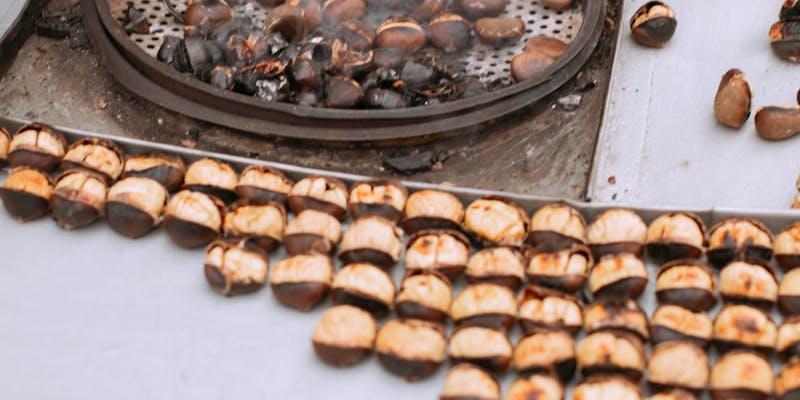Advertisement
Top 5 Health Benefits Associated With Water Chestnuts You Should Know
Mar 30, 2024 By Nancy Miller
The grass-like Eleocharis dulcis, more often known as the Chinese water chestnut, is endemic to a region that includes Australia, Africa, and parts of the Indian and Pacific seas, as well as several islands. It is not a kernel, contrary to its deceptive appellation. It is an aquatic form of vegetation that grows in submerged marshlands.
The water chestnut, sweet chestnut, and water caltrop are all biologically distinct species that are entirely unrelated and comprise different plant families. Underground development of a minuscule, spherical, edible corm and long, stem-like foliage are distinguishing features of canned water chestnuts. The portion of the plant that is most frequently consumed. Its firm consistency remains intact even after preparation, constituting a significant advantage.
Diverse Asian dishes and vegetable medleys frequently incorporate it. Aside from its distinctive flavor and consistency, the water chestnut is also highly regarded for its exceptional nutritional composition. Because of the numerous health benefits they provide, sliced water chestnuts are favored by many individuals. Following are the top 5 benefits for your health if you are considering using water chestnuts.

Heart-Healthy Choice
Water chestnuts make low-fat, cholesterol-free meals. Keeping blood cholesterol normal reduces the risk of cardiovascular disease and stroke. Adding canned water chestnuts to your diet may be good. Water chestnuts' low-fat content may aid weight loss. These crispy treats prolong aftertaste when consumed in large quantities. Their low glycemic index is helpful. Their carb-releasing ability ensures energy consistency.
Whole water chestnuts afford numerous health advantages due to their low glycemic index. Consuming foods that release energy gradually may assist in regulating blood sugar quantities. The management and prevention of diabetes could potentially gain significant advantages from this. In addition, their absence of cholesterol and fat renders water chestnuts compliant with the dietary guidelines for cardiac health. Adding them to your dishes adds more than a subtle taste and texture. By taking this action, you also demonstrate a commitment to your overall health and heart.
They have multiple applications, similar to whole water chestnuts. Their delicate flavor complements many components, which can be advantageous for stir-fries and salads. As such, incorporating them into your routine meal preparation may not be too difficult. Weight management, cholesterol control, or simply consuming more healthfully may benefit from incorporating water chestnuts into your diet. With a unique nutritional profile that does not sacrifice flavor or enjoyment, they assist you in attaining your health goals. Consume canned water chestnuts to improve your health in a straightforward yet effective manner.
Nutritional Food
Half a cup of sliced water chestnuts is a pleasant snack with additional advantages. You also keep your body healthy by providing it with extra nutrients. This 10% portion meets copper, manganese, potassium, and vitamin B6 RDAs. The advantages don't end there. Water chestnuts include phosphorus, magnesium, thiamine, and riboflavin.
Specific benefits of these nutrients will be addressed. Neurological and immunological functions rely on vitamin B6. Thiamine and riboflavin, which convert food into energy, are essential for basic body processes. Copper makes RBCs, whereas potassium regulates heart rhythm. Manganese strengthens bones and aids glucose and fat metabolism, according to Harvard Medical School.
Beyond the distinct benefits of these nutrients, additional factors are at play. Their synergistic effect benefits your overall health. For example, the minerals found in canned water chestnuts significantly impact the metabolism, bones, and cardiac frequency. A straightforward way to improve one's health with each bite, whole water chestnuts provide a delectable texture. Consequently, bear that in mind the next time you reach for a refreshment.
Low in Calories
When calorie restriction is a concern, sliced water chestnuts are a commendable substitute for other unwholesome refreshment choices. Saturating without significantly increasing caloric intake (60 calories in a half-cup) is owing to their elevated water content. This quality permits those monitoring their caloric intake to consume slightly more nutritious vegetables. Water chestnuts are an acceptable sustenance choice for diets that prioritize calorie restriction.
Consuming fewer calories may make it hard to locate enjoyable beverages. Here, water chestnuts are ideal. Their subtle sweetness and delectable texture contrast them with diet-friendly munchies. In addition, its balanced mineral and vitamin combination promotes healthy eating and optimal well-being. With their vital nutrients and calorie management, water chestnuts are a perfect addition to any balanced diet. Use canned water chestnuts as a nutritious snack, weight loss strategy, or overall effort.

Fiber for Digestive Health
Water chestnuts boost fiber and intestinal health. A half-cup of these nuts has 1.9 grams of fiber, about 7% of your daily fiber intake. According to the Mayo Clinic, men under 50 should consume 38 grams of fiber daily, while women should consume 25 grams. Men over 51 should aim for 30 grams, and women for 21. Therefore, why is fiber essential? One reason is digestion control. A high-fiber diet may help reduce weight, insulin control, blood pressure, and cholesterol.
Despite initial perceptions, whole water chestnuts and other high-fiber foods may meet your daily fiber requirements. Get enough fiber for digestive health and other benefits. Overweight people may benefit from appetite management. Since fiber limits sugar absorption, it helps people with diabetes and at-risk individuals maintain blood sugar levels. Fiber provides heart-healthy advantages beyond decreasing cholesterol and blood pressure. Many natural methods may enhance your health.
Natural Shields Against Chronic Diseases
Antioxidants, essential in the fight against harmful free radicals, are abundant in whole water chestnuts, in addition to their crunchy texture. Ferrulic acid is a particularly noteworthy antioxidant among these. It is particularly crucial in the battle against chronic diseases, as stated by Healthline. Research, most notably a 2016 study published in Oncology Reports, has cast light on the potential of ferulic acid to combat breast cancer. This research also established that ferulic acid eliminates breast cancer cells and inhibits their proliferation.
Flavonoids and other antioxidants combat free radicals in whole water chestnuts. Disease resistance is one of their main features. The Journal of Food Science studied this quality in 2016. Research on Chinese water chestnut peel extract demonstrated antioxidant and nitrate-removing properties that may combat cancer.
Sliced water chestnuts provide several health benefits, including their distinctive flavor and texture. Ferulic acid is one of numerous antioxidant flavonoids that may prevent cancer and other degenerative diseases. These built-in mechanisms may help the body fight free radicals. Foods with more nutrients may benefit our health, not simply make them crunchier.







